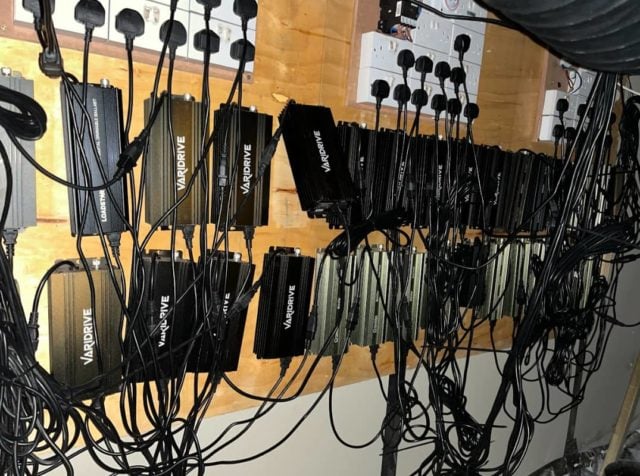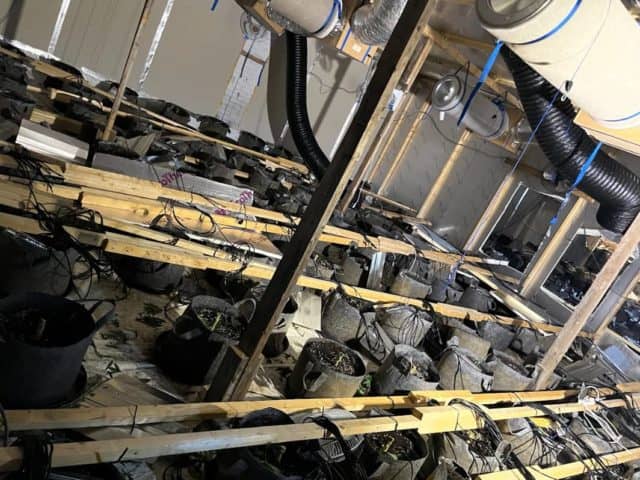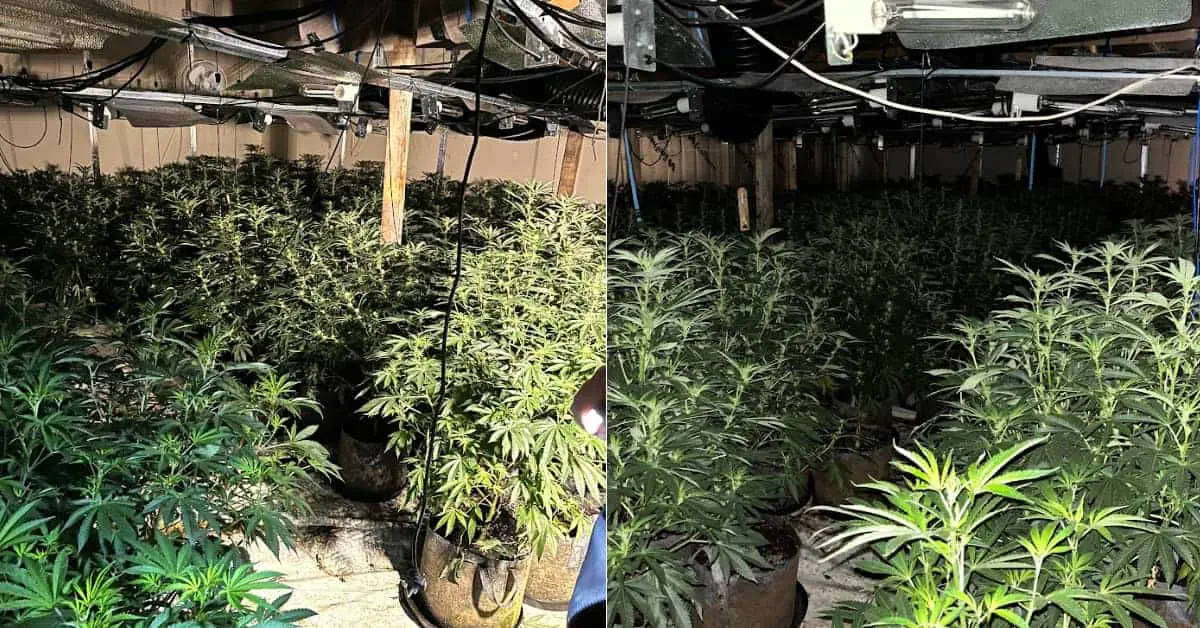At a scale and pace not seen before, police across England and Wales have coordinated a thousand search warrants against Organised Crime Groups (OCGs), arresting hundreds and seizing firearms, huge amounts of cash and cannabis plants worth approximately £115-£130 million.
Throughout June, police located and searched large-scale cannabis grows in the most significant national operation of its kind, aimed at unearthing and disrupting OCGs and their illegal revenue streams.
SEROCU operation
In the Hampshire, Thames Valley, Surrey and Sussex, SEROCU has coordinated this operation, with officers from each of the forces carrying out warrants, making arrests and disrupting those who wish to carry out this type of crime.
Across the South East, the following results were achieved:
- 58 warrants carried out
- 11,941 cannabis plants seized
- 43 arrests made
- 25 charges
- £15,990 seized

Op Mille: £1.7m of plants seized
Hampshire and the Isle of Wight Constabulary results from Operation Mille:
- 16 warrants
- 8 arrests
- seized over 4,320 plants, which an estimated street value of £1.7 million.
Rowlandson: Continuing our relentless pursuit of criminals
Detective Chief Superintendent Tim Rowlandson, Head of Intelligence, Tasking and Development for Hampshire and Isle of Wight Constabulary, said,
“Over the last month we have been continuing our relentless pursuit of criminals by targeting sophisticated and organised crime groups running cannabis factories within Hampshire and the Isle of Wight. In one factory alone this week, we uncovered over £400,000 worth of drugs. That’s money, which would otherwise have been used to fund further crime across the two counties.
“The operation has involved officers across all parts of the force. Local officers have been key to identifying potential sites – and engaging with communities afterwards to provide reassurance and gather evidence; Investigation teams have been taking the evidence gathered to pursue prosecutions and uncover more offenders; and yet others have supported with specialist skills.
“This was a whole force effort, which will massively disrupt the ability of these criminals to operate – and will play a significant role in keeping Hampshire and the Isle of Wight safe.”
A key source of illicit income for organised gangs
Criminal networks involved in drug dealing, money laundering and other violent offences were targeted by police and partner agencies, who focused resources to tackling large-scale cannabis cultivations – a key source of illicit income for organised gangs.

The links between serious crime and those involved in cannabis cultivation are clear, with the drugs trade fuelling gang violence as groups compete for territory and look to hunt out their opposition.
Arrests across the counties
Operation Mille saw searches and arrests across all counties in England and Wales. Suspected OCG members were arrested for offences including drug dealing, money laundering and possession of weapons.
Nearly 200,000 cannabis plants with an estimated street value of between £115-£130 million were seized, along with £636,000 in cash and 26 kilogrammes of cocaine. Of those arrested, more than 450 were later charged.
Causing disruption
The intensification period was designed to disrupt OCGs by taking out a key source of their revenue, while simultaneously apprehending many of those involved, safeguarding those being exploited, and increasing intelligence around how the networks operate.
National results from Operation Mille included:
- 1,013 warrants and searches
- 182,422 plants seized, worth an estimated £115-£130 million
- 967 arrested for offences including cannabis cultivation, money laundering and weapons offences
- 20 firearms seized
- £636,000 in cash seized
- 26 kilogrammes of cocaine seized, with a potential street value of £1 million
All 43 police forces across England and Wales, working with Regional Organised Crime Units (ROCUs) and partner agencies, dedicated resources to target the criminal networks involved in cannabis production and other serious criminality.
Jupp: Clear patterns around the exploitation and violence
Steve Jupp, the National Police Chiefs’ Council lead for Serious and Organised Crime, said,
“We know that organised networks involved in cannabis production are also directly linked to an array of other serious criminality such as class A drug importation, modern slavery and wider violence and exploitation.
“This operation not only successfully disrupted a significant amount of criminal activity, but the intelligence gathered will also help inform future law enforcement across the country.
“Cannabis-related crime is often thought to be ‘low level’, however there are clear patterns around the exploitation and violence OCGs are using to protect their enterprises. We also frequently find that cannabis production is just one aspect of their criminal operations and that they are complicit in wider offending which blights our communities.
“Working with law enforcement colleagues in the National Crime Agency, Immigration Enforcement, the ROCU network, and a host of other partner organisations, we’ve not only been able to disrupt the criminal operations of a significant number of organised crime groups, but also increased our understanding of their other criminal activities.”
Cannabis factories also present a very real local threat.
The size of criminal cannabis ‘factories’ means that damage is often caused to the properties themselves; the buildings can become dangerous as a result of fire risks, unlawful abstraction of electricity, fumes and water damage.
Anyone with information about a potential cannabis factory or drug dealing can contact their local force online or via 101.
People can also contact Crimestoppers, anonymously, on 0800 555 111 or crimestoppers-uk.org
Key signs to spot
There are some key signs to spot a property could be being used as a cannabis factory:
- Frequent visitors to a property at unsocial hours throughout the day and night.
- Blacked out windows or condensation on the windows, even when it is not cold outside.
- Bright lights in rooms throughout the night.
- Electricity meters being tampered with/altered and new cabling, sometimes leading to street lighting. High electricity bills could also be an indicator.
- A powerful, distinctive, sweet, sickly aroma and noise from fans.
- Lots of work or deliveries of equipment to an address, particularly those associated with growing plants indoors without soil such as heaters and lighting.
- An excessive amount of plant pots, chemicals, fertilisers, and compost.
News shared by Hampshire and Isle of Wight Constabulary, in their own words. Ed





